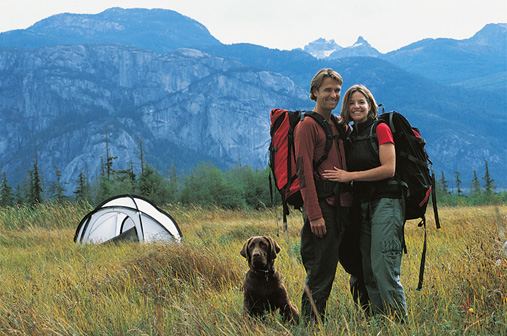Hiking and Camping with your Pet: The Biggest Risk
Attacks from predators? No. Falls? No. According to the AVMA, exposure to disease is a much bigger risk. From the AVMA website, some good-to-know info:
Outdoor enthusiasts and their animal companions (including dogs and horses) can be exposed to infectious diseases not only from infected animals and improperly cooked food, but also via insect vectors and contaminated soil and water. Diseases that are transmitted from animals to humans, either through direct contact with the animal or a contaminated surface or water, through ingestion of animal products (including meat and milk) or through insect transmission from an animal are called zoonotic (pronounced ZO-oh-NOT-ik or zoo-NOT-ik) diseases. Insects such as mosquitoes, ticks, flies, fleas or mites serve as vectors, capable of transmitting infection from an infected animal to another animal or a person.
Some common sense guidelines:
- Avoid camping/backpacking/hiking if you are feeling ill or if your animal companion is ill. People and animals are more prone to disease if their immune systems are weakened by other illnesses or conditions.
- Keep your outdoor gear (including tents, netting, sleeping bags, etc.) in good condition and repair or replace damaged items.
- Take precautions to minimize insect bites.
- Wash hands thoroughly with soap and water or an alcohol-based sanitizer immediately after handling animals, soil, equipment, or food.
- Wash tools, cooking equipment and working surfaces (including tables and cutting boards) thoroughly with soap and water after use. If contamination with soil or animal feces (stool) is suspected or known, disinfect the equipment and surfaces immediately. Adding a minimum of 1 tablespoon of bleach to 1 gallon of water is usually adequate for use as a cleaning/disinfecting solution.
- Avoid eating raw or undercooked meat.
- In the United States, campers and hikers/backpackers should report any signs of sick wildlife or wild bird die-off to the state’s game and fish agency or wildlife agency.
- Make sure your animal companions are up-to-date on their vaccines, especially rabies, prior to camping/hiking season.
- Consult your veterinarian about proper preventive treatments for your animals, such as heartworm prevention for dogs and cats, and use the products as recommended.
- Consult your veterinarian about regular stool exams of dogs to check them for parasites, including those that can be passed to people.
- Do not allow your dog to eat dead wildlife.
- Outdoor enthusiasts who regularly travel with animal companions should consider getting some basic training in human and animal first aid techniques. In addition, carrying a first aid kit with supplies for humans and animals is extremely important.
Tick-borne diseases and their prevention deserve a post all their own. Coming soon. In the meantime, take the proper steps to protect your pet and yourself, but get on out there!

